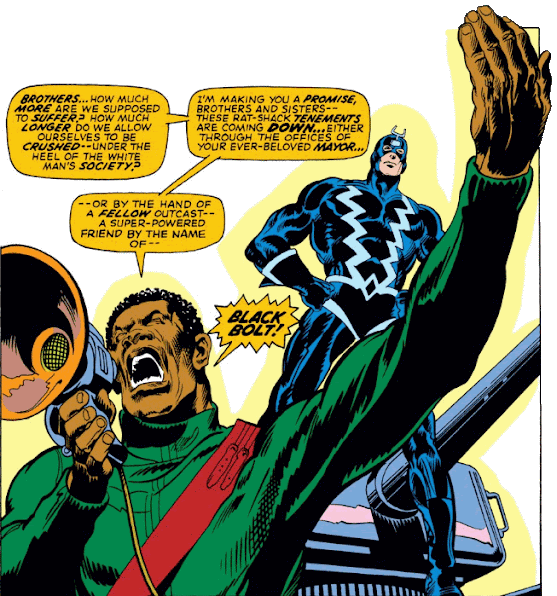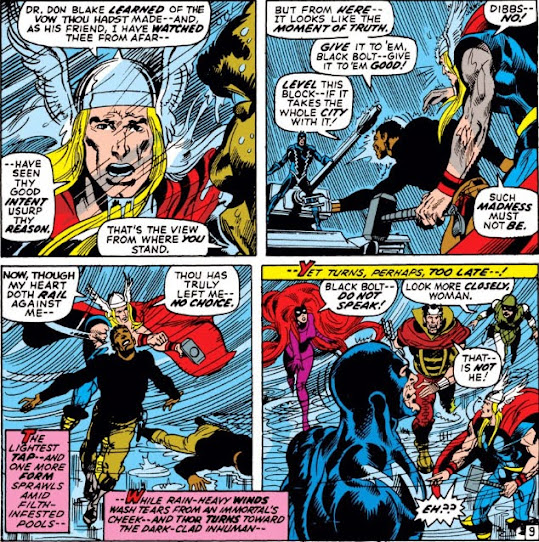In this two-part Inhumans story from 1971, it takes a little digging to get to the truth behind their deceptive covers:
And digging in a good way, since only one of these covers depicts an outright lie. In fact, you may as well know the bad news first: There is no Thor/Black Bolt battle taking place in this story. Thor and the other members of the Inhuman royal family, yes--though apparently they're not regarded as salesworthy as their leader, instead crammed into the corner box. But the good news is that writer Roy Thomas and artist Neal Adams, in tapping into the civil unrest of the early '70s, mix all the book's various ingredients together--the exiled Inhumans, the amnesiac Black Bolt, his young companion, an unscrupulous uncle, the Avengers, and the story's driving force, Lionel Dibbs--to make a compelling read. For a book that was struggling at the time to make both the Inhumans and the Black Widow attractive enough concepts to anchor a title of their own, this story gave every reason to believe that the Inhumans, at least, might have a future, either continuing in Amazing Adventures or elsewhere.
Thomas had laid the groundwork swiftly in the previous two issues, given that he had about ten pages per issue to rope in a potential reader. To boil it down:
In the Great Refuge, Maximus has emerged with an actual super-power--the ability to control minds. With Black Bolt in San Francisco investigating how best to integrate his race to the world of humans, Maximus moves to take control of the Refuge and drive out the royal family, while also afflicting Black Bolt with amnesia. With his cousins now searching for their leader, Black Bolt is befriended by a young boy, Joey, who was trapped in a life of crime by his uncle Roscoe until Black Bolt intervened--and with Joey in need of medical care, Black Bolt abandons his costume in order to more easily seek out and approach a physician.
Unfortunately, it's at this point when Maximus strikes, leaving Black Bolt without knowledge or direction, and Joey his only friend. Even more unfortunate is the fact that Black Bolt has no memory of the deadly power of his voice, a power that could cause untold destruction and death if he should utter a single word. When that moment comes, and Black Bolt, to his horror, destroys a mammoth docked ship, Lionel Dibbs finally emerges to offer a helping--well, gun.
Dibbs soon replaces his prosthesis--an artificial hand to cover his weapon--while offering Black Bolt and his young friend a quick getaway from the authorities who must be scrambling to arrive at the disaster scene. But Dibbs has been busy this night, and put two and two together regarding Black Bolt thanks to a source of information who seems to have found a more steady and profitable method of employment than petty theft.
Meanwhile, Gorgon, Medusa, and Karnak have arrived in the vicinity, and disguised themselves accordingly while they conduct their search for Black Bolt. Thomas seems to have no use for Triton, having him quickly ushered out of the story to serve as a distraction for hostile humans while his three cousins disappear into the city; in fact, Triton will be absent for the duration of this story, which doesn't speak well of this new direction of Thomas's to have the Inhumans operate within human surroundings and culture. Be that as it may, the rest of the Inhumans receive word of a disturbance where police and armed militants are facing off--a conflict spearheaded by Dibbs, and one other rather shocking participant.
In the story's concluding issue, word reaches the Avengers in New York, who it seems have not yet set up an exchange of information with the Fantastic Four regarding the appearance of new super-beings. (On the other hand, the FF might well have tried to present a show of good faith to the Inhumans by assisting them in keeping their existence secret.) Before the Avengers can act, however, one of their own moves to stay their hand.
The involvement of Thor in this affair is intriguing, to say the least--and Thomas helps this story by holding those cards close for now. For now, the real force of this story must be Dibbs, who discards the formality with which Thomas presented him in the last issue in favor of sheer anger and bitterness, and now reveals what seems to be his true purpose--razing the slums of his former neighborhood, armed with a contingent of men, a tank, and the power of Black Bolt, to the consternation of the other Inhumans.
Obviously these developments are part of other aspects to the plot which Thomas is revealing piecemeal. Dibbs' story will now play out before our eyes; but the burning question here is why Black Bolt, in his confused state, would align himself with Dibbs, who lured him into a trap. Whatever the reason, it seems his actions this day are bound to damage any overtures he might later attempt to make to the human race on behalf of the Inhumans. Whether that's a point that Thomas will address if and when Black Bolt regains his memory remains to be seen.
As for Dibbs, he's a man on a mission, and there is no placating him at this point.
Finally, the Inhumans decide to reveal themselves, mostly in the hopes of freeing Black Bolt from his amnesia. But as they make headway in gaining ground on Dibbs, they discover that the man has friends in high places, even if that's news to Dibbs, as well:
Again, the conflict that develops between Thor and the Inhumans is only secondary to the reason why everyone is here in the first place: Dibbs, and his conscription of Black Bolt in carrying out his plan. The police are trying to restore order and prevent the destruction which they've seen first-hand; the Inhumans only want to stop Dibbs in order to liberate their monarch from his influence; while Thor wishes to settle the violence out of a concern for Dibbs which only he understands. No one is particularly interested in comparing notes, least of all Dibbs--but when it comes to cutting through the red tape and reaching the heart of the matter, few can do it like the God of Thunder.
It's here we finally learn not only Thor's stake in all this, but Dibbs' as well, going back to when Dibbs was diagnosed with cancer. And as Thor takes Dibbs in hand and speaks with him, it's astonishing to see Thor follow up with his "patient" to this extent, as well as the level of empathy he shares in the hopes of reaching this man. We know that Thor has always held the human race close to his heart, and both Thomas and Adams do him proud here:
I don't know--would the first thought for anyone in need of a prosthesis be to look up Tony Stark, assuming they could manage an appointment with a man with such demands on his time within just an eight-week window? And would even Stark, still involved in manufacturing munitions and weapons at this time, actually agree to design a concealed weapon for him?
With Thor's presence here now explained, that leaves the mystery of Black Bolt's--especially for the other Inhumans, who fear the worst when Dibbs fails to be moved by Thor's words and orders Black Bolt to unleash his power. It's here, regrettably, that the foundation which Thomas has depended on to support this story's climax proves to be too shaky as a means to an end--and for a scene which otherwise brings this story to its resolution so powerfully, it can be seen as nothing short of a gaffe:
On the positive side, Roscoe being the one to usurp the identity of Black Bolt lines up perfectly with what we know of the man's unscrupulous nature--and with the exception of possibly Joey, no one is likely to shed a tear at his demise. But consider what we're being asked to believe--that Black Bolt's costume would give Roscoe super-power. That the fork-shaped antenna on the costume's mask enabled Roscoe to channel electron-manipulating power that he didn't possess. That, somehow, wearing that costume gave Roscoe the power to use his voice to the same destructive effect as Black Bolt would. With such a costume, you have to wonder why someone like Roscoe felt the need to follow Dibbs' lead, instead of taking to the air and staking out his claim as a new super-villain. "Dark Bolt," as it were.
That said, Thomas goes on to provide a nice touch to Dibbs' fate, which Joey and Black Bolt catch on their way to who knows where:
All in all, Thomas and Adams closed out their four-issue effort on Amazing Adventures with a powerful story, as well as a decent interpretation of the Inhumans which attempted to take these characters beyond the directionless stories of the title's first four issues. Yet the Inhumans would be featured in the mag for only two more issues; the Black Widow was less fortunate, and found her shared billing and involvement in the book ended here. But in the spirit of equal time, we'll touch on some of her stories from this period (also written by Thomas, among others) in a future post.






















3 comments:
If I remember correctly, Black Bolt destroyed that ship just by whispering - how did they cope when he was a baby ??!!
Among the earliest comics I ever bought, and half of it went over my head....but looking back, this really is Thomas and Adams in top form, all the more surprising given that Amazing Adventures was by no means a major-ranking title - were they doing it to try an build it up, or did they just love working with the characters?
Thomas really is on fire here, combining standard superheroics with social issues in a way that almost seems subtle compared to the overkill of the Green Lantern/Green Arrow work from around the same time.
Also interesting to see AA#8's Adams pencils being inked by John Verpoorten - surely the only time, and an unexpected teaming? I recall Adams damning Verpoorten's working with faint praise in an old Comic Book Artist interview...given the presumed esteem in which he was held, one wonders how such a teeming came about?
(One could speculate that Adams was so late with the delivery of said pencils that even Tom Palmer baulked, and JV was the only person willing to take it on :-))
Colin, good point! Unlike most Inhumans who were exposed to the terrigen mists after reaching maturity, Black Bolt's geneticist parents conducted experiments on him while he was in utero, which forced them to take special care with him after birth. Apparently Black Bolt was placed in a special chamber as a child and isolated from contact with all other Inhumans--the "sonic boom in a plastic bubble," so to speak.
B, despite how Amazing Adventures might have benefitted from the coherency a so-called "regular" artist team might have brought to this fledgling book (to say nothing of a regular writer), I thought it was interesting to see the different penciller/inker combinations that came about as a result of these quickly-plotted and briefly-lasting stories. For instance, I thought Verpoorten--something of a "floater" in terms of hopping from book to book at varied times for brief runs as finisher--did an excellent job with Adams' work; while Don Heck, in a few of the Black Widow stories, was inked by both Sal Buscema and Bill Everett, producing some nice results (and I'm rarely an admirer of Heck's work). I suppose one might argue that the try-outs in these titles by characters such as the Inhumans and the Widow were matched by try-outs of different artists who might be a good fit for them. :)
Post a Comment